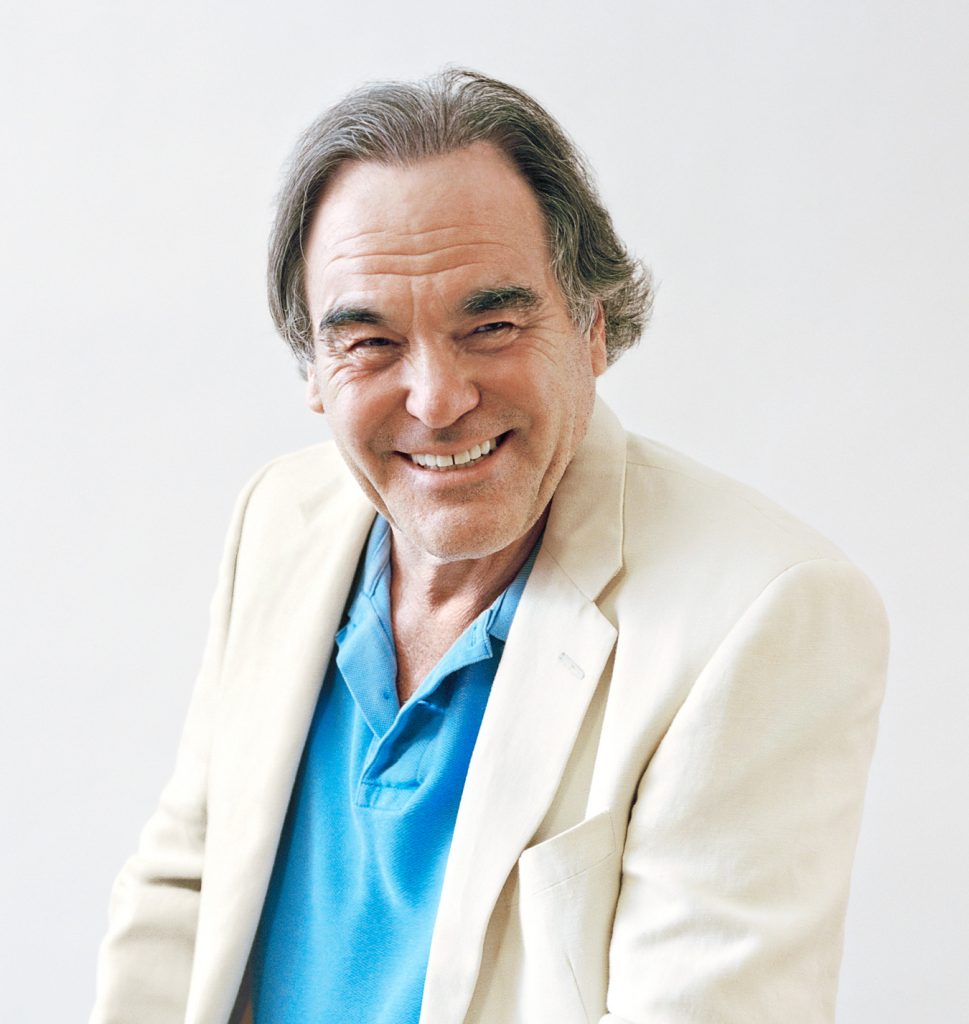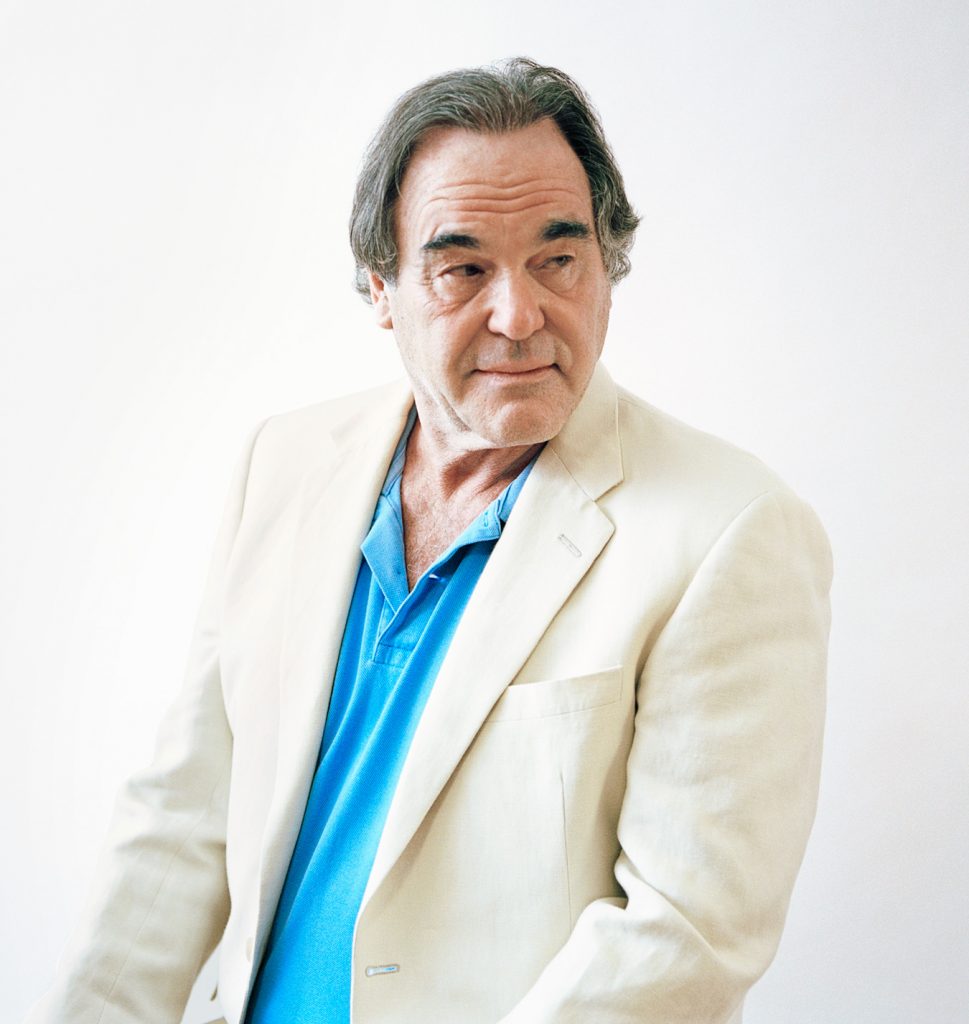Oliver Stone is a natural born storyteller. Ask the legendary director if he’s been to Vancouver before, and he launches into a tale that involves a damsel in distress, a white knight, and, because this is Oliver Stone, a not entirely happy ending.
“I saved a beautiful young woman many years ago in one of my heroic gestures, in 1978 or 7. I met her in Los Angeles, and she got involved in a strange cult, one of the quasi-scientific, quasi-religious cults. She ended up, according to her, imprisoned in the cult maybe 100 miles from Vancouver. I actually went up there. I got her out. She was completely nuts to begin with, but she was even nuttier after that,” he says with a slight smile and a mild shrug of his brow, in a what-are-you-gonna-do gesture. “We had an interesting relationship.”
His return to Vancouver promises to be less dramatic, if no less memorable. Stone will be a featured artist at Vancouver Biennale’s CineFest LIVE, a new supporting program within the larger public art exhibitions. During his June 12–15 residency, Stone will receive the Vancouver Biennale Sorel Etrog Lifetime Achievement Award, as well as take part in several programs, including screenings and panel discussions. Over the next several months, CineFest will host a retrospective of many of Stone’s theatrical releases and documentaries, but the main reason for his visit is to promote The Untold History of the United States, a 2012 documentary series produced, directed and narrated by Stone, and co-written with historian Peter Kuznick. The series aired on Showtime and came out on DVD, but Stone is on a mission to bring further awareness to the series, which spans 1898 to 2013. Each chapter explores an era of American history, including the First and Second World Wars, the Cuban Missile Crisis, and the post-9/11 War on Terror.
“Every single chapter has a radical interpretation of history that’s different from what you read in textbooks,” Stone says. “I’m not saying it’s the opposite, because part of what you read in textbooks is correct, but they don’t fill in the shadows.” An 800-page companion book provides greater detail and footnotes.
It nags at Stone that the series “was never accepted by the mainstream press as an unconventional telling of history,” he says, leaning forward as he sits on a sofa in the foyer of his West Los Angeles office. “So we’ve been pushing constantly to keep the attention [on it for] people who are looking for something different, not the conventional view of American history. It’s very important to me because all the themes of my films come together in this 12 hours.”
Stone’s roster of films is one of the most impressive and iconic bodies of work by any American director. Movie after movie, from Salvador to Platoon, Wall Street, Born on the Fourth of July, JFK, Natural Born Killers, and Nixon, Stone has looked at America and its policies and often drawn controversial conclusions by shining light into dark corners and poking at sleeping giants. His ability to ignite debate and challenge the status quo are part of what made him such a compelling choice for the Vancouver Biennale.
“There’s got to be a softening and understanding of history and the idea that politicians don’t have to be so hard. They don’t have to be tougher than the next guy. That doesn’t get you a victory.”
Stone talks softly, in a soothing cadence, words pouring out of him in a ceaseless torrent. He speaks in long, dense sentences that often touch on a dizzying, yet somehow united, array of topics before coming to a halt. Asked how the average citizen can figure out the truth if he can’t trust the mainstream media (a notion to which Stone subscribes), Stone first plugs Untold History, then calls for the dismantling of the American Empire, advises Canada to get out of the Five Eyes, decries money’s role in politics, suggests cutting the defense budget, praises teachers, criticizes Americans’ dependence on oil and decries fracking. Stone’s provocative views, and his willingness to promote them, both publicly and through his films, have garnered criticism from the right and from some of his colleagues.
He goes so far as to call himself “a pariah” in Hollywood, although his peers have honoured him three times with the ultimate insider’s accolade, an Academy Award, including Best Director for Platoon (1986) and Born On The Fourth Of July (1989).
Stone sees himself as a voice against what he considers an increasingly cozy relationship between big corporations, the government and the media, where what passes for entertainment he considers nothing more than propaganda. He castigates newly returned TV series 24, and movies like Blackhawk Down and Zero Dark Thirty for their glorification of violence and military force. In a recent commentary for MovieMaker magazine, Stone writes that he doubted art and movies could affect positive change, but when asked why he continues to make films if they have no positive social impact, he says the alternative is unpalatable. “Otherwise, do you join the bad guys and turn out pap like 24 or the stuff celebrating the CIA and Pentagon because you think America’s the good guy all over the world because we go and interfere in other people’s countries and try to tell them what do to? We bring on regime changes in other countries. I think we’re really in need of a conscience, and I’m not the only one, but, my God, it’s at a premium now because the amount of propaganda, the amount of influence that the government agencies have in Hollywood, has never been bigger.”
Stone, who once said “Either you’re born crazy or you’re born boring”, was born in 1946 in New York City. He dropped out of Yale to teach at a high school in Saigon before enlisting in the U.S. Army in 1967. Wounded twice in Vietnam, he was awarded a Bronze Star for heroism and a Purple Heart for his service. “I love the idea of this country,” he says of the United States. “Do I love every town with every fast food franchise in it? The way they treat people? The quality of life sometimes? No. It’s a lovely country. It’s got great potential resources, but it’s really been trashed and exploited.”
A lover of history, Stone says he decided to tackle The Untold History of the United States as a way to “understand what the hell happened to the country I grew up in” following George W. Bush’s presidency. Stone wanted to know, “was Bush an aberration or was he really a continuation? It’s exaggerated, but he’s a continuation,” he concluded.
Even though Stone admires some world leaders, including Mikhail Gorbachov, for whom he has a strong affinity, as well as John F. Kennedy and Nikita Khrushchev (and their sense of restraint that helped avoid another world war), his exhaustive research led him to the blunt and bold assessment that “from World War II on, I really essentially think the United States made every wrong decision possible”. He argues that two “myths”—that the U.S had to drop the atomic bomb and that the Cold War was necessary—“set the whole tone of where we are today”.
Stone’s studies revealed patterns of U.S. interventionism, “a constant need to be tough”—even when not the most prudent course of action— and a deep desire to fight the “bad guy”, to the extent of creating villains in the absence of real ones. Or, as Stone explains it: “the resort to caveman emotions is so quick.”
He ends the series with a simple message: loving one another may be our only hope. “I know that sounds very hippie, but I mean it,” he says. “Real love is real power. Obviously people are not going to love each other because that’s not the nature of mankind, but there’s got to be a softening and understanding of history and the idea that politicians don’t have to be so hard. They don’t have to be tougher than the next guy. That doesn’t get you a victory.” His trip to Vancouver is indicative of his passion, his belief in education, and his belief in socially conscious art, no matter how high the odds are stacked against it.











